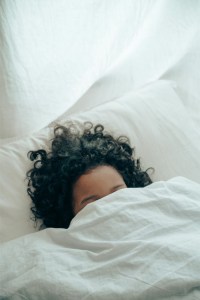 When we think of what constitutes a good night’s sleep, we often think in terms of how many hours we slept. However, while hours of sleep are certainly important, how long we slept is not the only measure of sleep quality.
When we think of what constitutes a good night’s sleep, we often think in terms of how many hours we slept. However, while hours of sleep are certainly important, how long we slept is not the only measure of sleep quality.
Also of consideration is Sleep Efficiency, which refers to the percentage of time spent in bed that you are sleeping. For instance, you may get 8 hours of sleep, on the surface indicating a healthy sleep. But let’s say you spent 20 hours of the day in bed. Your sleep efficiency would then be 8/20, or 40%. Research on sleep hygiene suggests that we should aim for close to 100% sleep efficiency, such that, ideally, we are asleep (and not awake) when we are in bed.
Another measure of sleep quality is wakefulness. Let’s say that you get 8 hours of sleep and that your Sleep Efficiency was over 95%. From those two measures, we can say that a person is probably sleeping well. Although, that may not be the case. What if, out of those 8 hours of sleep, you woke up every 30 minutes? What on the surface seems to be a good quality sleep is actually one with frequent awakenings and likely, in turn, daytime fatigue.
Other lesser-known measures of sleep quality reflect physical restlessness or movement during sleep. Frequent limb motions and tossing and turning can lead to a restless night’s sleep. So, you may get those 8 hours of sleep, but, if you spent much of the night tossing and turning, it is more likely you won’t wake up as refreshed.
 There is also Sleep Latency, which refers to how long it takes you to fall asleep. If you’ve ever had a night in which you climbed into bed and found that your mind is racing so much that you can’t fall asleep, you likely experienced a sleep characterized by poor Sleep Latency. Ideally, we want Sleep Latency to be as little as possible in order for a person to avoid those kinds of nights in which it takes so long to fall asleep.
There is also Sleep Latency, which refers to how long it takes you to fall asleep. If you’ve ever had a night in which you climbed into bed and found that your mind is racing so much that you can’t fall asleep, you likely experienced a sleep characterized by poor Sleep Latency. Ideally, we want Sleep Latency to be as little as possible in order for a person to avoid those kinds of nights in which it takes so long to fall asleep.
A recent study conducted by a member of the FSC team uncovered evidence to suggest that these different measures of sleep quality operate differently from one another and don’t always perfectly correlate. That is to say, it is possible that you get an adequate number of hours of sleep, but your Sleep Efficiency is poor, and you awaken frequently.
Given these different ways that we can measure sleep quality, we have some recommendations on how to achieve a healthy night’s sleep that do not just take into account whether you got your 8 hours or not. These recommendations largely come from a treatment for sleep problems called Cognitive-Behavioral Therapy for Insomnia (also known as CBT-I). These recommendations are not meant to substitute practicing CBT-I with the guidance of a mental health provider, but, rather, serve as tips and tricks you can implement to get a better night’s sleep.
Tip 1: The bed is meant for sleeping.
Many people use their beds for all sorts of things – eating, watching TV, reading, or talking on the phone, for instance. The problem with using your bed for things other than sleep is that it trains your mind to associate your bed with being awake. In other terms, we want our bed to be a mental cue for us to sleep, but, if we do all sorts of other activities in bed, we are telling our mind and our body that it is okay to be awake in bed. With the exception of sex, it is the recommendation to only use your bed as a place to sleep.
Tip 2: If you’re awake for a while at night, get out of bed!
Yes, this recommendation sounds somewhat contradictory, but getting out of bed in the middle of the night can actually help you get a better night’s sleep in the long run. If you wake up at night and notice your mind is racing, your body feels awake, and that you do not think you will naturally fall asleep soon, we recommend getting out of bed. The reason for this again has to do with teaching our mind and body that our bed is a place for sleep and not a place where it is okay to be awake. If this is the case, we recommend getting out of bed and engaging in some kind of mundane task that does not require much cognitive energy and, therefore, won’t wake you up even more. Some mundane tasks include doing the laundry, washing the dishes, or engaging in some light reading.
 Tip 3: No Clock Monitoring!
Tip 3: No Clock Monitoring!
It is very tempting and common to check the time when you wake up in the middle of the night. Unfortunately, this kind of hyper-attention to time can prove detrimental to our sleep. Checking your clock can create anxiety (i.e., “It’s 2am and I haven’t fallen asleep yet! My day tomorrow is going to be so tough) or can decrease your willingness to sleep more (i.e., “It’s 5am. It’s close to 7am, which is when I need to wake up. It’s not worth trying to fall back asleep). Setting alarms is alright – just try to avoid checking the clock frequently in the night.
Tip 4: Avoid caffeine
Caffeine is a stimulant that promotes wakefulness and affects our levels of the sleep hormone melatonin. When you’re tired during the day, turning to a cup of coffee or an energy drink can be appealing to give you a much-needed energy boost. However, doing so may hinder your sleep. Generally, avoid caffeine within 6-8 hours of going to bed. A cup of coffee in the morning can be fine but having one too close to bedtime may affect how well you sleep.
Tip 5: Pursue sleep therapy with an expert
There are a number of ways in which a mental health provider can help you achieve a better night’s sleep. Research suggests that a therapeutic treatment like CBT-I can actually lead to greater sleep efficiency and less wakefulness than some commonly prescribed sleep medications. CBT-I is a multi-faceted insomnia treatment that incorporates a range of beneficial behavioral and cognitive skills, including stimulus control, sleep restriction, relaxation training, sleep hygiene, and cognitive restructuring.
You’ve likely heard of the adage that we need to get 8 hours of sleep each night, but our sleep is more complex than that. Attention to other measures of sleep quality, including wakefulness and sleep efficiency, can improve our sleep even if we get 8 hours of sleep and still find ourselves exhausted in the day. Poor sleep can affect our mood, energy, concentration, and so much more. So, taking the time to think more about how you’re sleeping and making seemingly small adjustments can have significant impact.





